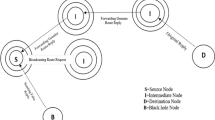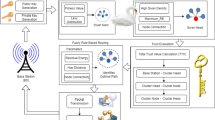Abstract
The existence of a non-cooperative or black hole node as an intermediate node in a mobile network can degrade the performance of the network and affects the trust of neighbor nodes. In this paper, a trust-aware routing protocol is defined for improving the routing reliability against black hole attacks. A new Trust aware and fuzzy regulated AODV (TFAODV) protocol is investigated in this work as an improvement over the existing AODV protocol. The session-driven evaluation of stability, communication-delay, and failure-ratio parameters are conducted for evaluating the trust of nodes. The fuzzy rules apply to these parameters for computing the degree of trust. This trust vector isolates the attack-suspected and trustful nodes. The proposed TFAODV protocol used the trustful mobile nodes as the intermediate path nodes. The proposed protocol has been experimented with in the NS2 simulation environment. The analytical results are obtained in terms of PDR ratio, Packet Communication, Loss rate parameters. The comparative results are derived against the AODV, Probabilistic AODV, PDS-AODV, PSAODV, and Juneja et al. protocols. The analysis is performed on different scenarios varied in terms of network density, degree of stability, and the number of attackers. The simulation results ensured the proposed TFAODV protocol has improved the PDR ratio and reduced the communication loss significantly against these state-of-art protocols.













Similar content being viewed by others
Data availability
Not applicable.
Code availability
Not Available.
References
Mwangi, E. G., Muketha, G. M., & Ndungu, G. K. (2019). A review of security techniques against black hole attacks in mobile ad hoc networks. In IST-Africa week conference (IST-Africa) (pp. 1–8).
Gurung, S., & Chauhan, S. (2019). Performance analysis of black-hole attack mitigation protocols under gray-hole attacks in MANET. Wireless Networks, 25, 975–988.
Nabou, A., Laanaoui, M. D., & Ouzzif, M. (2018). Evaluation of MANET routing protocols under black hole attack using AODV and OLSR in NS3. In 6th international conference on wireless networks and mobile communications (WINCOM) (pp. 1–6).
Tseng, F. H., Chiang, H. P., & Chao, H. C. (2018). Black hole along with other attacks in MANETs: A survey. Journal of Information Processing Systems, 14(1), 56–78.
Gurung, S., & Chauhan, S. (2019). A survey of black-hole attack mitigation techniques in MANET: Merits, drawbacks, and suitability. Wireless Networks, 26, 1981–2011.
Golchha, P., & Kumar, H. (2018). A survey on black hole attack in MANET using AODV. In International conference on advances in computing, communication control and networking (ICACCCN) (pp. 361–365).
Pooja, V. S., Rohit, T., Reddy, N. M., & Sudeshna, S. (2018). Mobile ad-hoc networks security aspects in black hole attack. In Second international conference on electronics, communication and aerospace technology (ICECA) (pp. 26–30).
Dhende, S. L., Shirbahadurkar, S. D., Musale, S. S., & Galande, S. K. (2018). A survey on black hole attack in mobile ad hoc networks. In 4th international conference on recent advances in information technology (RAIT) (pp. 1–7).
Mistry, M., Tandel, P., & Reshamwala, V. (2017). Mitigating techniques of black hole attack in MANET: A review. In International conference on trends in electronics and Informatics (ICEI) (pp. 554–557).
Satav, P. R., Jawandhiya, P. M., & Thakare, V. M. (2018). Secure route selection mechanism in the presence of black hole attack with AOMDV routing algorithm. In Fourth international conference on computing communication control and automation (ICCUBEA) (pp. 1–6).
Gurung, S., & Chauhan, S. (2018). A dynamic threshold based approach for mitigating black-hole attack in MANET. Wireless Networks, 24(8), 2957–2971.
Mohammad, S. N., Singh, R. P., Dey, A., & Ahmad, S. J. (2018). ESMBCRT: Enhance security to MANETs against black hole attack using MCR technique. In Innovations in electronics and communication engineering (pp. 319–326).
Hammamouche, A., Omar, M., Djebari, N., & Tari, A. (2018). Lightweight reputation-based approach against simple and cooperative black-hole attacks for MANET. Journal of Information Security and Applications, 43, 12–20.
Rajendran, N., Jawahar, P., & Priyadarshini, R. (2019). Cross centric intrusion detection system for secure routing over black hole attacks in MANETs. Computer Communications, 148, 129–135.
Mahin, S. H., Taranum, F., Fatima, L. N., & Khan, K. U. (2019). Detection and interception of black hole attack with justification using anomaly based intrusion detection system in MANETs. International Journal of Recent Technology and Engineering, 8(11), 2392–2398.
Albalas, F., Yaseen, M. B., & Nassar, A. (2019). Detecting black hole attacks in MANET using relieff classification algorithm. In 5th international conference on engineering and MIS (ICEMIS'19) (p. 6).
Tiruvakadu, D. S., & Pallapa, V. (2018). Honeypot based black-hole attack confirmation in a MANET. International Journal of Wireless Information Networks, 25, 434–448.
Sivanesh, S., & Dhulipala, V. (2020). Accurate and cognitive intrusion detection system (ACIDS): A novel black hole detection mechanism in mobile ad hoc networks. Mobile Networks and Applications. https://doi.org/10.1007/s11036-019-01505-2.
Sundar, S., & Kittur, H. M. (2019). Random ID based secure AODV to prevent black hole attack in MANET. International Journal of Innovative Technology and Exploring Engineering (IJITEE), 8(12), 1725–1729.
Sharma, D. (2019). Efficient detection of black hole attack in mobile adhoc networks using a TRUST based scheme. International Journal of Recent Technology and Engineering, 8(4), 2740–2744.
Sharma, D. (2019). DRI-based implementation for detecting and eliminating cooperative black hole nodes in MANET. International Journal of Recent Technology and Engineering, 8(3), 8192–8198.
Saranya, R., & Rajesh, R. (2019). Utilization of energy consumption metric to detect black hole attacker in dsr routing protocol. International Journal of Recent Technology and Engineering, 8, 6116–6120.
Tamilselvi, P., & Babu, C. G. (2019). An efficient approach to circumvent black hole nodes in manets. Cluster Computing, 22(5), 11401–11409.
Aravindhar, D. J., Sophia, S. G., Krishnan, P., & Kumar, D. P. (2019). Minimization of black hole attacks in adhoc networks using risk aware response mechanism. In 3rd international conference on electronics, communication and aerospace technology (ICECA) (pp. 1391–1394).
Khamayseh, Y., Yassein, M. B., & Abu-Jazoh, M. (2019). Intelligent black hole detection in mobile AdHoc networks. International Journal of Electrical and Computer Engineering, 9(3), 1968–1977.
Delkesh, T., & Jamali, M. A. (2019). EAODV: Detection and removal of multiple black hole attacks through sending forged packets in MANETs. Journal of Ambient Intelligence and Humanized Computing, 10, 1897–1914.
Gurung, S., & Chauhan, S. (2019). A dynamic threshold based algorithm for improving security and performance of AODV under black-hole attack in MANET. Wireless Networks, 25, 1685–1695.
Arulkumaran, G., & Gnanamurthy, R. K. (2019). Fuzzy trust approach for detecting black hole attack in mobile adhoc network. Mobile Networks and Applications, 24(2), 386–393.
Merlin, R. T., & Ravi, R. (2019). Novel trust based energy aware routing mechanism for mitigation of black hole attacks in MANET. Wireless Personal Communications, 104, 1599–1636.
Dorri, A., Vaseghi, S., & Gharib, O. (2018). DEBH: Detecting and eliminating black holes in mobile ad hoc network. Wireless Networks, 24, 2943–2955.
Yasin, A., & Zant, M. A. (2018). Detecting and isolating black-hole attacks in MANET using timer based baited technique. Wireless Communications and Mobile Computing, 2018, 10.
Elmahdi, E., Yoo, S. M., & Sharshembiev, K. (2020). Secure and reliable data forwarding using homomorphic encryption against blackhole attacks in mobile ad hoc networks. Journal of Information Security and Applications, 51, 102425.
Liu, K., & Zhou, L. (2020). Routing authentication chain mechanism to resist AODV black hole attacks. In ACM international conference proceeding series (pp. 53–57).
Priya, S., & Suganthy, P. (2019). A trust based multipath routing for black hole attacks with group search optimization routing. International Journal of Recent Technology and Engineering, 8(3), 3407–3415.
Keerthika, V., & Malarvizhi, N. (2019). Mitigate black hole attack using hybrid bee optimized weighted trust with 2-Opt AODV in MANET. Wireless Personal Communications, 106, 621–632.
Thanuja, R., & Umamakeswari, A. (2019). Black hole detection using evolutionary algorithm for IDS/IPS in MANETs. Cluster Computing, 22(2), 3131–3143.
Moudni, H., Er-rouidi, M., Mouncif, H., & Hadadi, B. E. (2019). Black hole attack detection using fuzzy based intrusion detection systems in MANET. Procedia Computer Science, 151, 1176–1181.
Fahad, A. M., Ahmed, A. A., Alghushami, A. H., & Alani, S. (2018). Detection of black hole attacks in mobile ad hoc networks via HSA-CBDS method. In International conference on intelligent computing & optimization (pp. 46–55).
Juneja, K. (2020). DRI table based traffic-behaviour analysis approach for detection of blackhole attack. International Journal of Sensors, Wireless Communications and Control, 10(1), 79–93.
Juneja, K. (2019). Probabilistic dempster shafer based communication behaviour analysis for attack safe communication in mobile network. Pertanika Journal of Science and Technology, 27(3), 1301–1316.
Juneja, K. (2020). Random-session and K-neighbour based suspected node analysis approach for cooperative blackhole detection in MANET. Wireless Personal Communications, 110(1), 45–68.
Funding
No funds received for this research.
Author information
Authors and Affiliations
Corresponding author
Ethics declarations
Conflict of interest
There is no conflict of interest, financial or others. I as sole author ensured the ethics approval and participation of the research.
Additional information
Publisher's Note
Springer Nature remains neutral with regard to jurisdictional claims in published maps and institutional affiliations.
Rights and permissions
About this article
Cite this article
Juneja, K. Trust-Aware Fuzzy Evaluation Method for Preventive Route Generation in Mobile Network. Wireless Pers Commun 119, 3673–3697 (2021). https://doi.org/10.1007/s11277-021-08426-y
Accepted:
Published:
Issue Date:
DOI: https://doi.org/10.1007/s11277-021-08426-y




